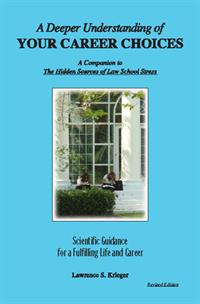 Excerpt (Introduction):
Excerpt (Introduction):
A Deeper Understanding of Your Career Choices
Finding the right work is a challenging undertaking for most people, and lawyers are definitely no exception. It is therefore good that most law students begin to think about jobs and career questions early in law school - finding work that suits you will take time and attention, and it is tremendously important to your satisfaction in life. On the other hand, you must be clear at the outset that a job, in itself, is not going to “make” you happy. Instead, modern science has identified certain attitudes, priorities, and life management skills that make the most substantial, consistent contributions to an enjoyable, satisfying life. Once you understand the key attitudes and values, you can incorporate them into your thinking to create a successful job search. The purpose of this booklet is to address both steps of this process, first by describing for you the established sources of life satisfaction, and then by showing you how to apply that understanding to find work that suits your specific needs and preferences. The ideas here involve universal principles, and should serve you well, both now and later in your career.
I begin by explaining the established sources of human happiness, and then pose two key questions - relating to Tuesday and Saturday mornings - to help you sort through the "what" and the "where" of the work you choose. We will explore questions that students ask regularly and that may already be on your mind: Should you mainly focus on salary and benefits? Is it better to work in a large firm, a small firm, or a public service setting? How do you factor in your personal life or family needs? What if a good opportunity requires long days and/or weekend work? Which of these different considerations should receive the most emphasis when making your decisions? In a nutshell: What will you need from your work, so that you are happy in your life and your career?
After describing the key considerations for your job search, I describe the phenomenon of "burnout," how quickly it can happen, and how the principles in this booklet protect you. I conclude by recounting the selection processes - one successful and one unsuccessful - of two of our students, to illustrate the application of these principles.
The Scientific Realities of a Satisfying Life and Career
Scientists have learned a great deal in the past two decades about the things that determine whether your life is satisfying and enjoyable, or not . . . . (text continues)
